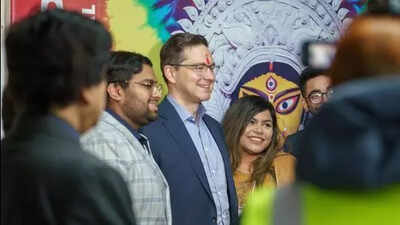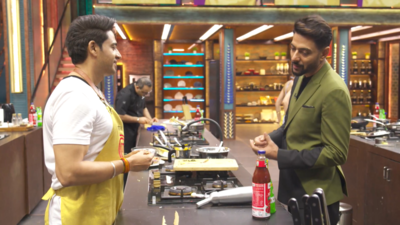In April 2022, Conservative leadership contender Pierre Poilievre attended a community event at the Vancouver home of Aditya Tawatia, a realtor and long-time participant in Indo-Canadian civic and political circles. The event, attended by local supporters, was one of many such gatherings on Poilievre’s cross-country campaign tour. Tawatia donated $1,675 to Poilievre’s leadership bid—the maximum allowed under Elections Canada rules—and has since contributed additional funds to the Conservative Party.
Tawatia is one of several Indo-Canadian professionals who previously helped establish the Overseas Friends of BJP Canada, a group created in 2014 to support political change in India. While the organisation is no longer active, some of its former leaders remain engaged in Canadian politics and community advocacy, and have supported Poilievre’s leadership and the broader Conservative movement. Their involvement has drawn attention in recent weeks, raising questions about diaspora political activity, foreign influence, and the role of diaspora organisations in Canadian campaigns.
A recent Global News piece scrutinised the contributions, suggesting a coordinated effort by former BJP sympathisers to shape Canadian politics. The report raised the spectre of foreign interference, citing the past affiliations of donors who helped set up or participated in BJP-aligned diaspora groups. Yet for critics of the story, the controversy is less about foreign meddling and more about a double standard.
‘Groundbreaking news’: The Online Backlash
Conservative figures and commentators swiftly pushed back. “Canadian citizen who was born in India gave the legal amount for an individual to Pierre Poilievre,” wrote Daniel Bordman. “More groundbreaking news at 11…” Ezra Levant framed the issue more bluntly: “The Conservatives raised $41.7 million in 2024 from over 200,000 donors. One Canadian who is friends with India’s PM donated $1,675… That—and not Mark Carney’s $250 million loan from China—is foreign interference, to Global News.”
To supporters of Poilievre — and to many within the Indo-Canadian community — the entire episode reflects a deeper discomfort within Canada’s political and media class: a discomfort with certain immigrant communities being politically active, particularly when their values and affiliations lean right.
“This is how democracy works,” said Tawatia to the Globe and Mail. “We are the most patriotic Canadians. We are doing good things for democracy. We like the Conservative Party — so what?”
That view is echoed by others formerly involved in diaspora groups aligned with the BJP. They stress that their early work was about rooting out corruption in India’s Congress Party government, not pushing a foreign agenda in Canada. Since then, many have reorganised into domestic community groups focused on Indo-Canadian issues. Several no longer have ties to Indian political parties, but maintain strong views on Canada’s relationship with India and on growing tensions over the Khalistan movement.
A Diaspora Caught in a Diplomatic Firestorm
The renewed spotlight on former Friends of BJP leaders comes at a tense time in Canada-India relations. In June 2023, Sikh terrorist leader Hardeep Singh Nijjar was gunned down in the parking lot of a gurdwara in Surrey, B.C. Months later, Prime Minister Justin Trudeau made an explosive statement in Parliament: Canadian intelligence believed the Indian government was involved in the assassination.
Indian intelligence reports show that Nijjar was not simply an activist, but had been undergoing arms training in Pakistan under the protection of groups hostile to both India and the West. He was reportedly connected to efforts aimed at reviving Sikh militancy and recruiting for separatist causes from Canadian soil. A Canadian commission report later found no ‘definitive link’ between any foreign involvement and Nijjar’s assassination.
The allegations — strongly denied by India — shattered diplomatic relations. Trade talks were suspended. High commissioners were expelled. But in parts of Canada’s Indian diaspora, especially among Hindu-Canadians, Trudeau’s intervention didn’t feel like a defence of sovereignty. It felt like the government was taking sides.
“The big challenge we find is the Khalistani element,” said Shiv Bhasker, a former OFBJP official and Poilievre donor who later formed the Overseas Friends of India Canada. Bhasker said his group has lobbied for stronger Indo-Canadian ties and raised concerns about what he described as Khalistan-linked intimidation of Hindu Canadians — including at temples and community events.
“Hindu-Canadians don’t feel safe,” he said. “They feel that intelligence agencies and police forces have been compromised, or at least infiltrated by these Khalistan elements.”
Not everyone agrees. Balpreet Singh of the World Sikh Organization called the depiction of Khalistan supporters as a threat to national security “a narrative right out of India.” He pointed out that Canada’s RCMP has accused India of serious criminal activity — not the other way around.
“The idea that the RCMP is being told what to do by Khalistanis is absurd,” Singh said. “India has engaged in transnational repression here in Canada. That’s what’s at issue.”
Political Allegiances, Community Confusion
Caught in the middle of this diplomatic and ideological dispute are Canadian politicians — especially Conservatives, who have been careful in their statements about both India’s conduct and Sikh community concerns.
Poilievre has attended multiple community events hosted by former OFBJP organisers. In October 2022 and again in 2023, he spoke at Diwali functions on Parliament Hill co-hosted by Bhasker’s Overseas Friends of India Canada and the Canada India Global Forum — the rebranded version of one of the OFBJP organisations. He sat next to India’s High Commissioner to Canada just weeks after Trudeau’s bombshell Nijjar allegation. A Conservative spokesperson defended the appearances, saying they were community celebrations, not political endorsements.
Still, some in the Sikh community view the appearances as tacit approval. “It is really concerning if those are the individuals now donating, promoting, and pushing candidates,” said a spokesperson for the Sikh Federation of Canada. “It suggests a lack of distance between our political class and foreign-linked networks.”
Within the Indo-Canadian community itself, opinions are divided. Some, like Bhasker, remain staunchly Conservative and believe the party aligns best with their economic and cultural values. “We don’t believe in handouts,” he said. “We want to work hard. We want lower taxes. We want smaller government.”
Others feel let down. Azad Kaushik, another former OFBJP leader who formed the National Alliance of Indo-Canadians, said some recent Conservative candidates appeared sympathetic to Khalistan. “I’m a hardcore Conservative,” he said. “I’ll vote Conservative. But we are not happy.”
And then there was Don Patel.
The Don Patel Fallout
In early 2025, the Conservative Party dropped its candidate in Etobicoke North, Don Patel, after he “liked” a social media post that suggested sending Khalistani activists to India for Prime Minister Modi to “take care” of them. His emoji reaction — a heart and a hug — triggered criticism. The party disavowed him, calling the post “clearly unacceptable.”
The incident highlighted the minefield the Conservatives now find themselves in. On one hand, they are trying to court a growing base of Indo-Canadian voters who feel disenchanted with the Liberals. On the other hand, they are under pressure to draw a line between cultural solidarity and ethnic nationalism.
Tawatia, for one, insists that this is about Canada — not India. “I have so many friends in Toronto who are not Conservative,” he said. “This narrative that we are some kind of foreign influence operation — it’s nonsense.”
Influence or Interference?
For now, the debate shows no signs of slowing. Canada has passed legislation to create a foreign agent registry, similar to the US system that governs overseas political activities. But the system is not yet operational. In the meantime, diaspora engagement continues — legally, loudly, and with growing political visibility.
The line between engagement and interference remains murky. Some argue it’s a distinction of transparency and intent: donations made openly by Canadian citizens, regardless of heritage, should not be lumped in with covert influence. Others argue the ecosystem of ethnic politics — especially when linked to countries with global ambitions — deserves closer scrutiny.
In the end, the controversy surrounding Poilievre’s Indo-Canadian donors may say less about them and more about Canada’s ongoing struggle to reconcile multiculturalism with foreign policy, and diaspora activism with national interest.
As one observer put it: “You can’t ask immigrants to integrate and then panic when they participate.”









